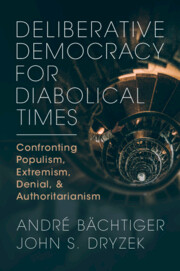 Deliberative Democracy for Diabolical Times
Deliberative Democracy for Diabolical Times Book contents
- Deliberative Democracy for Diabolical Times
- Deliberative Democracy for Diabolical Times
- Copyright page
- Contents
- Preface
- 1 An Introduction for Diabolical Times
- 2 Deliberation for Realists and Skeptics
- 3 Democracy in a Diabolical Soundscape
- 4 How to Deliberate with (and against) Populists
- 5 How to Deliberate with (and against) Extremists
- 6 How to Deliberate with (and against) Deniers
- 7 How to Deliberate with (and against) Authoritarians
- 8 How to Deliberate with Everybody
- 9 How to Renew a Deliberative Democracy
- References
- Index
5 - How to Deliberate with (and against) Extremists
Published online by Cambridge University Press: 28 March 2024
- Deliberative Democracy for Diabolical Times
- Deliberative Democracy for Diabolical Times
- Copyright page
- Contents
- Preface
- 1 An Introduction for Diabolical Times
- 2 Deliberation for Realists and Skeptics
- 3 Democracy in a Diabolical Soundscape
- 4 How to Deliberate with (and against) Populists
- 5 How to Deliberate with (and against) Extremists
- 6 How to Deliberate with (and against) Deniers
- 7 How to Deliberate with (and against) Authoritarians
- 8 How to Deliberate with Everybody
- 9 How to Renew a Deliberative Democracy
- References
- Index
Summary
Political extremists want to redefine and narrow who belongs and who does not in a society, often by trying to push groups such as immigrants, other ethnic groups, races, or religions out. This is what far-right extremists try to do. Redefinition can also mean trying to pull one’s own group out of society. This is what radical Islamists in Western societies try to do. Extremists of whatever variety have a common interest in fracturing the public sphere where broad-scale public deliberation is engaged. Non-deliberative approaches to extremism include bans and restrictions on extremist expression and consensus institutional designs to induce moderation. After noting their limitations, Chapter 5 turns to deliberative responses, beginning with the (limited) prospects for direct engagement with extremists. A multilayered approach involves starting with possibilities for reaching those who might be attracted to extremism (but also be attracted to other possibilities), deploying discursive psychology in the interests of building bridges. This approach then moves on to contemplation of the role that designed deliberative forums might play and finishes with a look at how performances by political leaders can try to set terms of discourse in the public sphere that can negate extremist appeals.
Keywords
- Type
- Chapter
- Information
- Deliberative Democracy for Diabolical TimesConfronting Populism, Extremism, Denial, and Authoritarianism, pp. 111 - 131Publisher: Cambridge University PressPrint publication year: 2024
